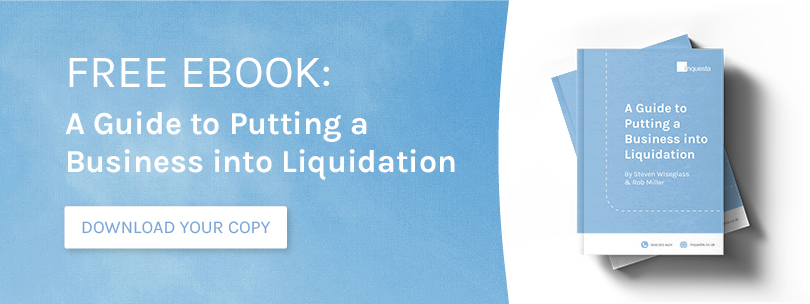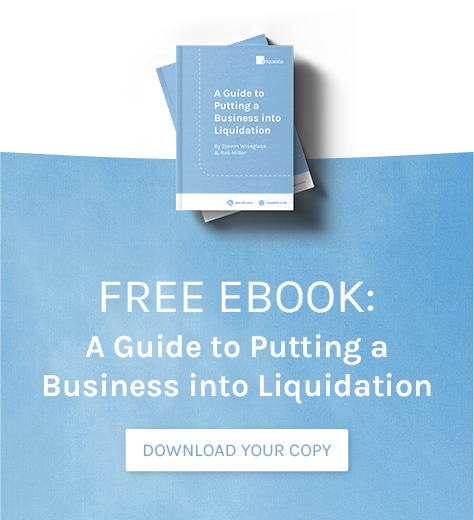The day-to-day running of a business as director is a highly involved and often stressful job, even when things are going well. When your business is struggling financially and the threat of liquidation is looming it can be hard to keep track of what’s up and what’s down.
If you’re a director of a limited company either in liquidation or in fear of it in the near future, it’s vital that you understand how your role is likely to change. Failure to adhere to what’s expected of you during liquidation can lead to potentially serious repercussions, so it’s important that you understand a directors responsibilities in liquidation of a business.
How to Tell if a Company is Insolvent
A company is seen to be insolvent if the total value of its debt exceeds the value of assets on a balance sheet. Early signs of insolvency include poor cash flow and an inability to settle debts. If your business is exhibiting signs of insolvency, it’s advised that you seek advice from an insolvency expert as soon as possible.
If a company is insolvent, it means that the business is in serious danger of being forced to close down. It’s vital that you, as director, know when your business is deemed insolvent. This is because as director, your responsibilities are likely to change once the company ceases trading.
If you’re ever unsure on the status of your firm, it is recommended that you speak to a specialist as soon as possible. An insolvency expert can provide an independent opinion on solvency and help steer you in the right direction.
How do Directors’ Responsibilities Change in Liquidation?
When a company is entering into insolvency, the core duties of the directors are expected to change significantly. During the day-to-day running of a healthy business, a director is expected to act in the best interests of themselves and their shareholders. However, when a company is faced with liquidation, their responsibility moves from the company shareholders to its creditors.
In fact, a directors duty to the creditors will override all other duties and responsibilities. The principles of how directors’ responsibilities should change in the event of insolvency are clearly laid out in the Insolvency Act 1986.
Directors’ Duties in Liquidation
If your company has become insolvent, your responsibilities will immediately alter massively. From ensuring an immediate cease in trading and appointing an insolvency practitioner, to preparing a Statement of Affairs and assisting in the liquidation process, the duties of a company director during the liquidation process are often highly varied.
Examples of directors’ duties in liquidation, things that you must adhere to, can include the following:
1. Cease Trading
If your business is deemed to be insolvent, it is important that you cease trading immediately. Failure to do so can often result in company directors being accused of unlawful or wrongful trading, according to Section 214 of the Insolvency Act 1986.
Ceasing your firm’s trading means exactly that — bringing the whole operation to a halt. Stop supplying your product/service, issuing invoices, paying your team, looking for financing options, etc.
Company liquidators, when instructed, are obligated to investigate the conduct of directors prior to liquidation. If it is proven that you acted unlawfully you can face serious repercussions.
2. Hold Meeting for Shareholders
As head of your company, you are responsible for holding a shareholders meeting in order for them to vote on the future of the business.
If 75% of shareholders vote to wind up the business, it is also your responsibility to formally declare for voluntary insolvency with Companies House.
3. Gain Consent of Creditors
Recent changes in the law have altered this responsibility. Where previously directors would be responsible for calling a Deemed Consent Procedure meeting of your creditors, now they must request that the insolvency practitioner convene the meeting.
Deemed Consent Procedure is necessary in order to get creditors to agree to the appointment of a liquidator. If no more than 10% of your creditors oppose the proposal, a liquidator may be appointed to your case.

4. Appoint Liquidator
It is your legal obligation to appoint a licensed insolvency practitioner once your company becomes insolvent. Their role will include the following:
- Settle outstanding legal disputes or contracts
- Sell off firm assets to pay creditors
- Pay liquidation costs and VAT bill
- Keep creditors informed in the process and consult them when necessary
- Make the payments to creditors
- Investigate the directors
- Formally remove the business from the register of companies
- Create Statement of Affairs
5. Create Statement of Affairs
If you are declaring voluntary insolvency, one of your final acts as director is to prepare a written Statement of Affairs.
This statement is essential in the handing over of responsibility from director to liquidator, and should include the following information: The value of assets; a recent balance sheet; lists of creditors, suppliers, and employees; and an exhaustive record of existing debts.
If liquidation is compulsory, the responsibility of creating a statement of affairs will lie with your liquidator.
6. Assist the Liquidator
During the process, your liquidator will likely make a number of requests. This can vary from asking for documents that may assist with their investigation, to a face-to-face interview regarding your conduct leading up to insolvency.
It is a legal responsibility for the company director to attend, and assist to the best of your ability, during the interview with the liquidator. Failure to comply with any requests or to attend the interview will lead to the liquidator likely being forced to get the courts involved.
7. Settle Directors’ Loan Accounts
Often one of the final responsibilities a director may have during liquidation, any overdrawn directors loan accounts must be settled. If you are unable to settle the overdrawn account with personal funds, you may be expected to enter into an Involuntary Voluntary Agreement (IVA), or even declare bankruptcy,
If it is suspected that any loans written-off in the past may have contributed to the dire financial situation the business is in, these loans may be reinstated.
What Happens if a Director Doesn’t Keep Up with Their Responsibilities

As company director, failure to keep up with responsibilities during liquidation can have serious repercussions. From director disqualification and being made liable for company debts, to heavy fines, penalties, or even prison sentences (if the infraction is seen to be serious enough).
If a director doesn’t keep up with their responsibilities, potential consequences include:
- Failing to cease trading when insolvency becomes apparent could result in accusations of wrongful trading. This can lead to disqualification from being a director of yours, or any company, for up to 15 years. It could also result in you being made personally liable for company debts.
- Consciously continuing to trade while knowingly insolvent is a criminal offence known as ‘fraudulent trading’. If found guilty, you could face a fine, or even a prison sentence.
- Refusal to assist with the liquidation process could lead to repercussions. For example, failure to attend, or remain honest throughout the legally required interview with your liquidator could result in an Insolvency Service Investigation against you.
- Additionally, should you refuse to supply any of the requested documentation, your liquidator may apply to the courts, who can either compel you to cooperate, or forcibly seize the required documents.
If you’re ever unsure of your obligations — or unable to fulfil them — you should seek immediate advice from an insolvency expert.
How Inquesta Helps Directors During Liquidation
Inquesta understands that liquidation is a highly stressful time for all involved in a company, from members of the team right up to directors and shareholders. As a licensed insolvency practitioner, we offer holistic solutions for every aspect of the liquidation process.
Our vast experience has allowed us to help business owners from a broad spectrum of sectors to liquidate their businesses in the most effective and efficient way possible. We also appreciate that every case is unique, so offer a tailored approach to each and every one of our valued clients.
From initial consultation, through to presenting solutions, everything we do has your best interests at heart. We can help if your business needs a solvency review and will be on hand to take ownership of the liquidation process if needed.
Put simply, liquidation is made easier when you tackle it with Inquesta. We operate in a huge variety of areas in the field of insolvency. For assistance and guidance with business recovery, administration, company voluntary arrangements (CVAs), and beyond, request a free no-obligation consultation today or get in touch with a member of our team.



